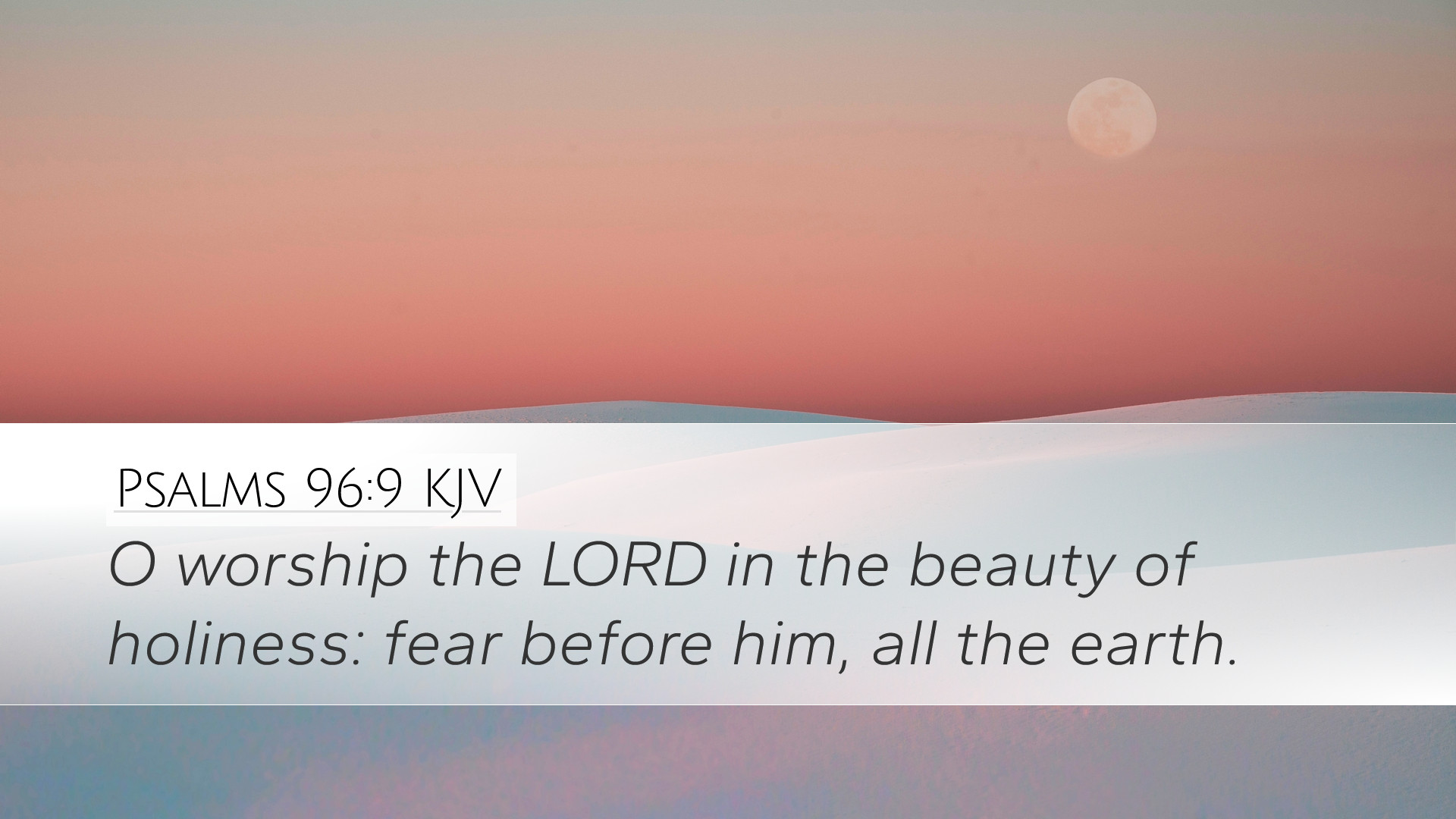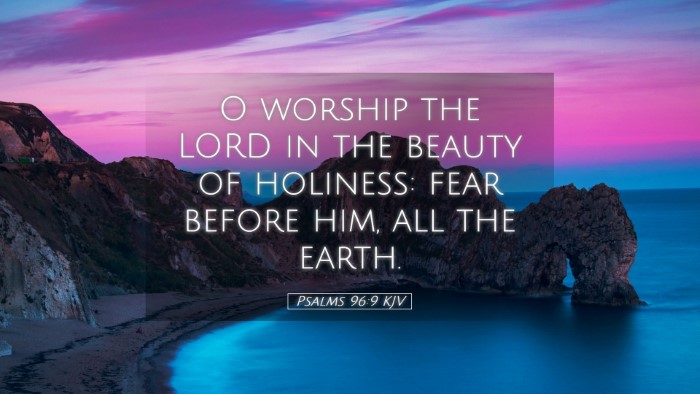Psalms 96:9 Commentary
Verse: "Worship the LORD in the beauty of holiness: fear before him, all the earth." (KJV)
Introduction
This verse from the Psalms encapsulates the essence of true worship, emphasizing both the reverent attitude we must have toward God and the intrinsic beauty found in holiness. It serves as both an invitation and a command, calling the worshipers to approach the Lord with awe and reverence.
Contextual Background
The Book of Psalms is a collection of hymns, prayers, and meditations, spanning a wide range of human emotions. Psalms 96, in particular, is a hymn calling for all creation to rejoice in God's reign. As the psalmist expresses in this verse, worship is not merely a ritualistic act but an authentic response to God's holiness.
Insights from Commentaries
1. Matthew Henry's Commentary
Matthew Henry reflects on the instructive nature of this verse, highlighting the call to worship God. He emphasizes that worship should be conducted "in the beauty of holiness," which he interprets as being adorned with the qualities of holiness. Henry posits that true worship involves both an inner purity and an outward expression of reverence.
- Worship in Purity: The phrase "beauty of holiness" speaks to the purity required in worship. Worshippers are to come before God with cleansed hearts and a genuine desire to honor Him.
- Universal Call to Worship: Henry notes that the phrase "fear before him, all the earth" underscores that all humanity is called to recognize God’s sovereignty and authority.
- Emotional Engagement: He also asserts that the fear of the Lord mentioned here is not a cringing terror but a reverent and respectful posture before the Creator.
2. Albert Barnes' Commentary
Albert Barnes elaborates on the theological implications of the verse, noting that worship encompasses both attitude and action. He explains that "beauty" in worship aligns with God's character and majesty, suggesting that divine holiness is inherently attractive.
- The Essence of Worship: Barnes asserts that worship must be "in spirit and in truth" (John 4:24). This call to authenticity filters to the core idea of worship reflecting God’s nature.
- Global Implications: He also points out the extensive scope of worship, where "all the earth" signifies not just the people of Israel but all nations, conveying a prophetic vision of international worship.
- Fear and Awe: The blend of fear and worship is critical; Barnes interprets "fear" as a recognition of God's greatness, urging believers to approach God with an understanding of His holiness and power.
3. Adam Clarke's Commentary
Adam Clarke provides a more practical interpretation, focusing on the implications of worship for believers. He emphasizes that worship must also exemplify a life transformed by holiness.
- Holiness in Life: According to Clarke, the call to "worship in the beauty of holiness" implies that one’s lifestyle should reflect the sanctity and purity of the God that we worship.
- Keeping the Fear of God: Clarke underscores that to "fear before him" has crucial implications for moral and ethical living, encouraging believers to conduct themselves with integrity and respect for God’s commandments.
- Public Worship Expressions: He also notes that true worship should be articulated publicly, reinforcing that worship is not only a private affair but a communal expression of faith.
Theological Themes
This verse encapsulates various theological themes significant for preaching and teaching:
- The Nature of God: God is depicted as holy and worthy of reverence. His holiness is the basis for our worship.
- Human Response: The appropriate response to God’s nature is worship, rooted in both fear and love, establishing a balance between awe and intimate relationship.
- The Role of the Community: The global invitation to worship emphasizes the communal aspect of faith, suggesting that worship transcends individual experience.
- The Expectation of Transformational Worship: True worship is response-based; it should lead to a transformation of character and lifestyle that reflects God’s holiness.
Conclusion
Psalms 96:9 calls believers to engage in worship that honors God’s holiness while fostering a profound respect and reverence. Insights from key biblical commentators provide a holistic understanding of the text, encouraging pastors, students, and scholars alike to reflect on how corporate and personal worship should embody the beauty of holiness and an acknowledgment of God's divine authority. As such, this verse serves as a foundational tenet for robust theological discourse and practical application within church life and personal devotion.


